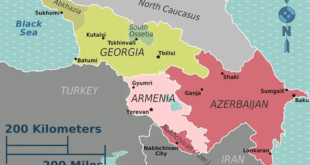 Officials in Armenia and Azerbaijan have confirmed an outbreak of military clashes in two regions of the disputed territory of Nagorno-Karabakh. Officials on both side confirmed multiple casualties, including two Azerbaijani soldiers killed.
Officials in Armenia and Azerbaijan have confirmed an outbreak of military clashes in two regions of the disputed territory of Nagorno-Karabakh. Officials on both side confirmed multiple casualties, including two Azerbaijani soldiers killed.
At least one side said clashes were continuing.
The fighting appeared to be the most serious violation in years of the cease-fire agreement between Baku and Yerevan over the territory, which is dominated by ethnic Armenians and located within Azerbaijan.
The mood in Armenia was already tense, with a 20-day state of emergency declared in response to opposition-led protests over a presidential election in mid-February.
Skirmishes broke out in two separate districts of northwest Karabakh, with gunfire and shelling reported in three villages in the Terter and Goranboy regions.
Armenian and Azerbaijani officials have each blamed the opposing side for initiating the clashes amid conflicting reports about how they began.
Armenian Foreign Minister Vartan Oskanian told RFE/RL’s Armenian Service that Azerbaijani forces were responsible for initiating a “serious challenge to Armenian forces” and suggested more substantial military hardware was involved than had been in any previous violations of the 1994 cease-fire agreement that brought an end to major hostilities over Nagorno-Karabakh.
Oskanian accused Baku of striking at a moment when Yerevan is particularly vulnerable, with the state of emergency in place since government troops and police forcibly dispersed opposition protesters in clashes on March 1 that left at least eight people dead.
“We condemn this challenge, and we think that this is an attempt by the Azerbaijani side to exploit the current situation in Armenia,” Oskanian said. “Perhaps they thought we had focused all of our attention on our internal situation, and that this could provide them with a psychological advantage, but this hasn’t proved the case.”
Baku, meanwhile, rejects the accusation from Yerevan, saying it was Armenian forces who began the fighting. Foreign Ministry spokesman Khazar Ibrahim told RFE/RL’s Azerbaijani Service that he believed authorities in Yerevan devised the conflict in order to divert attention from the weekend chaos.
“This is a clear provocation by Armenia,” Ibrahim said. “They are trying to use the situation which is taking place in Yerevan after the elections and are trying to divert the attention of their citizens and population from the internal and domestic issues in order to seek an external enemy.”
Tension has been chronic between Yerevan and Baku over the status of Nagorno-Karabakh. Internationally monitored negotiations to resolve the conflict have scored minor achievements, but a final resolution appears distant.
Armenian and Azerbaijani forces clashed over the territory in a 1991-94 war that displaced some 600,000 Azeris and left as many as 25,000 people dead. Both sides continue to claim the territory as their own.
Azerbaijani President Ilham Aliyev has used his country’s mounting oil wealth to stoke tensions further. He has funneled more than billion into bolstering the country’s defenses. On a trip to western Azerbaijan on March 3, Aliyev told reporters that diplomatic efforts “are not enough,” adding that, “to resolve the Karabakh conflict, we have to be strong, we have to be ready to liberate our lands by military means, and we are ready.”
The U.S. State Department reports that between 30-40 people die each year in Karabakh as a result of violations of the cease-fire. If confirmed, however, these latest clashes would be the worst fighting seen in the disputed territory in years, and come at a particularly delicate time in Armenian-Azerbaijani relations.
Matthew Bryza, the U.S. co-chair of the Organization for Security and Cooperation in Europe’s (OSCE) Minsk Group, which oversees negotiations on Nagorno-Karabakh, is currently in Baku, as is Ambassador Andrzej Kasprzyk, the personal representative of the OSCE chairman in office. Both are holding talks with officials on restoring the terms of the cease-fire.
Source: Agencies
 Eurasia Press & News
Eurasia Press & News



